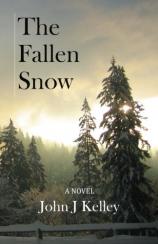Reading Group Guide
Discussion Questions
The Fallen Snow

1. The Fallen Snow is told in parallel timelines: the present of Joshua’s return to Virginia, and a second of his wartime experiences in France. Why do you think the author chose to tell the story in this fashion? Did you find the format helpful or a hindrance to your enjoyment of the tale?
2. A subtle interplay of opposing seasons exists between the two timelines. Events in Virginia unfold from autumn to late winter / cusp of spring while scenes in France take place from spring to late summer / cusp of autumn. Were you aware of this juxtaposition while reading the tale? Did the seasons—or the dichotomy of seasons—color the mood of certain scenes or the overall story?
3. The natural setting plays an essential role in the novel, often used to emphasize character attributes and situations. What is the significance of placing the drama within a wilderness threatened by relentless logging? How do Joshua, Elisabeth and Katie respond to their surroundings, and what do their responses reveal about them?
4. Speaking of natural elements, what is the metaphor of the fallen snow, both as explained by Joshua’s grandmother and as it emerges within the story? Does the nature of snow, ethereally and physically, contribute to themes of the tale? If so, in what way?
5. Of course, the novel extends beyond the rural Virginia setting, with a number of scenes in and near the western front as well as in wartime Paris. Did you find the war-zone scenes convincing? Was Paris, long associated with romance, a fitting setting for Aiden and Joshua to explore and ultimately consummate their relationship?
6. A number of symbols appear in The Fallen Snow. How do the following play a role and what do you feel each represents? Moon / Moonlight, the Saint Christopher medal, Music & Art, the Stone Cabin.
7. The human, flawed characters of The Fallen Snow at times bruise each other emotionally. What are examples of characters ignoring the feelings of others? How do intention and instinct play into their hurtful actions?
8. Joshua struggles with the role of instinct throughout the novel, from his feelings for Aiden and Katie to his actions as a sniper, even in his attempts to recover from his trauma. How does instinct help him? When do his instincts harm or lead him astray? In what ways do other characters act on instinct?
9. Though Joshua clearly suffers from Post-Traumatic Stress Disorder (PTSD), known then as “shell-shock,” he ignores the single, fleeting acknowledgment of his trauma in the opening pages. His reaction is unsurprising, as the condition was in that era considered a mental defect, a weakness. Have attitudes truly changed today? Would a modern-day Joshua face any less of a challenge?
10. Joshua also struggles with expectations before, during and after the war. What were some of those expectations? Were they realistically depicted? Does Joshua handle them maturely? Does he ultimately resolve them?
11. Elisabeth faces many challenges as well. Some are physical concerns, while others involve expressing herself and asserting her will. As the story unfolded, did you feel she was a victim of the actions of others, namely Wayne, or did she constrain herself? In what ways does she seek to find her voice? Does she succeed? On a related matter, do you feel her faith in Wayne was justified?
12. In response to both real and perceived expectations, the characters of The Fallen Snow sometimes repress their emotions. Can you cite examples? Could you relate to the characters’ motivations and feelings?
13. Kelley has shared that one inspiration for writing The Fallen Snow is his fascination with the ways individuals learn life lessons from others, even when the individuals are not aware of the sharing. An example he cites is Claire’s account of her mourning of David, which echoes and informs Joshua’s experience after the war. What are other examples of a character sharing a life lesson with another character?
14. It has also been suggested the book explores the many ways people experience love. What relationships are explored in the novel (husband and wife, for example)? Did a particular relationship intrigue you? If so, why? Did you reflect upon your own relationships as a result?
15. How do you see Katie and Joshua’s relationship? Does Joshua love Katie? What does Katie see in Joshua? Given the expectations of the era, they might well have married. From what you learn of them, how do you envision that relationship might have evolved? Could they have been happy together?
16. Regret and atonement are prominent themes of the novel. What regrets do the following characters carry, as expressed or suggested – Joshua, Wayne, Elisabeth, Aiden, Grandmother? Did particular regrets strike a chord with you? If so, which ones and why?
17. Did you have a favorite character? If so, who? Did a particular character capture your interest? If so, why? How did each major and minor character evolve during the course of the novel?
18. Of all the characters, Claire is most cognizant of her longing for home. But she is not the only lost soul. In what ways do Joshua and other characters reveal their need for home, their quest for a place where they belong?
19. Kelley has said that, while it was clear from the start the novel was a coming-of-age tale, he found defining the genre a challenge. In your opinion, what genre best defines The Fallen Snow?
The Fallen Snow
- Publication Date: December 19, 2012
- Genres: Fiction, Gay & Lesbian
- Paperback: 318 pages
- Publisher: Stone Cabin Press
- ISBN-10: 0988414805
- ISBN-13: 9780988414808







